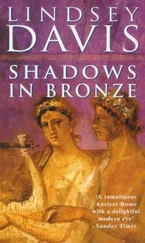Lindsey Davis - Enemies at Home
Здесь есть возможность читать онлайн «Lindsey Davis - Enemies at Home» весь текст электронной книги совершенно бесплатно (целиком полную версию без сокращений). В некоторых случаях можно слушать аудио, скачать через торрент в формате fb2 и присутствует краткое содержание. Жанр: Исторический детектив, на английском языке. Описание произведения, (предисловие) а так же отзывы посетителей доступны на портале библиотеки ЛибКат.
- Название:Enemies at Home
- Автор:
- Жанр:
- Год:неизвестен
- ISBN:нет данных
- Рейтинг книги:3 / 5. Голосов: 1
-
Избранное:Добавить в избранное
- Отзывы:
-
Ваша оценка:
- 60
- 1
- 2
- 3
- 4
- 5
Enemies at Home: краткое содержание, описание и аннотация
Предлагаем к чтению аннотацию, описание, краткое содержание или предисловие (зависит от того, что написал сам автор книги «Enemies at Home»). Если вы не нашли необходимую информацию о книге — напишите в комментариях, мы постараемся отыскать её.
Enemies at Home — читать онлайн бесплатно полную книгу (весь текст) целиком
Ниже представлен текст книги, разбитый по страницам. Система сохранения места последней прочитанной страницы, позволяет с удобством читать онлайн бесплатно книгу «Enemies at Home», без необходимости каждый раз заново искать на чём Вы остановились. Поставьте закладку, и сможете в любой момент перейти на страницу, на которой закончили чтение.
Интервал:
Закладка:
I told him which slaves were under suspicion; Simplicius said none, not even the scribe Melander, was in the room for the will-signing. ‘Only witnesses were admitted. Mucia Lucilia was present, though of course she took no part.’
I managed not to growl at that. ‘Simplicius, it looks as if Aviola and Mucia were murdered by robbers, but if Aviola’s slaves attacked him as the vigiles suggest, I have to consider if the new will caused disgruntlement. There will have been talk about it, as you say.’
‘Unfounded rumours can influence staff,’ he agreed.
I said, ‘I am interested in two aspects. Were there any large bequests, ones that might make someone want Aviola dead in order to cash in? Don’t alarm yourself. This is something we always have to consider, when somebody dies in bad circumstances. Also, what does he have to say about his slaves? Who did he intend to liberate, for example?’
‘Or not !’ added Simplicius heavy-handedly, wafting more lotion scents in my direction. I smiled as if I thought him extremely astute.
Yes, I was ashamed of using flattery. But it is undeniably useful.
Valerius Aviola owned several hundred slaves, mostly of the rural type, working as agricultural labourers on his estates. He intended to free a hundred, the most he was allowed.
At this point, Sextus Simplicius finally had someone fetch the scroll and while I sat tantalised by its proximity, the scribe read out the hundred names. Juno, I had to listen to every one, even though most had no relevance because they worked on Aviola’s country estates. I chewed the end of my stylus, trying not to let my eyes glaze over.
None of the hundred manumissions were given reasons. A general heading stated briefly that all these slaves would be rewarded with their freedom ‘for their hard work and loyalty’. Of those on my list, only Libycus and Daphnus were to be freed.
‘Fascinating!’ I checked my note tablet. ‘I wonder how Aviola made his choices? Amethystus and Diomedes are a couple of old lags and won’t be surprised to be excluded. Libycus is an obvious candidate for freedom; he was the personal valet, so they had an intimate relationship. Daphnus not so, however. He’s bright, a go-getter, painfully ambitious, and may have caught Aviola’s eye as someone who deserved a chance. But he is only eighteen, and only a tray carrier. Sextus Simplicius, you must have been to the house often. Do you know Daphnus?’
Simplicius raised his heavy shoulders and looked shifty. He probably did not even know the names of his own tray carriers. Daphnus would have been a silent presence placing a drink in front of him, worthy of less notice than the drink.
‘Others won’t like him jumping the queue. Take Nicostratus, the door porter — a responsible position − he was nearly thirty, so may well have been hoping for his freedom soon. He has died of his injuries, so he won’t have to know …’
Some of Aviola’s deserving slaves had been freed in his lifetime, when they became eligible, the steward for one. Polycarpus and a few others were rewarded for past services with minor bequests.
‘Polycarpus!’ Simplicius recognised his name with enthusiasm. ‘He will be looking for a new position now my poor friend has passed on. To be truthful, I was already eyeing up the situation. There was a rumour that Mucia Lucilia wanted to kick him out and have her own steward take charge. Well, one way or the other, I am hoping to snaffle Polycarpus myself!’
There can be a scramble for good employees after a death, and apparently after a marriage, though I had met his own steward who seemed pleasant and efficient. When I asked what would happen to that man, Simplicius said cold-bloodedly that the fellow would have to accept being pushed aside and sold off. He actually joked that if he , Simplicius, was then found murdered, I would know who did it.
I replied that this would be most helpful.
I knew that four of the refugee slaves (the second porter Phaedrus, the attendant Amaranta, the musician Olympe and the philosopher Chrysodorus), plus at least one sent to Campania (the steward Onesimus), had belonged to Mucia Lucilia. I asked Simplicius if he knew anything about Mucia’s will, since Roman law did grudgingly allow a woman to dispose of her own property. He claimed to have no idea, though I screwed out details of a freedman who had acted as her official guardian before she married.
We moved on to an outline of Aviola’s bequests.
In the will as it stood, I was told, there were a number of gifts to close relatives and old friends. There were rewards for the two executors, payments which Simplicius described demurely as ‘generous’. Overall, however, no one person would receive a whacking amount. Freedmen and women were provided with pensions but ordered to continue service to the family in various non-controversial ways. Donations were made to temples. The usual perk was earmarked for the emperor, a bribe to dissuade him from seizing more. Domitian’s reaction could never be guessed in advance, but Simplicius told me no one, not even the paranoid tyrant who ruled Rome, had a real reason to speed up Aviola’s departure to Hades in order to inherit. Their legacies would be welcome yet were not enormous.
As was a wife’s right, an allowance was left to Mucia Lucilia. Simplicius and I discussed the legal problems with both that bequest and her dowry; he intended to take advice (I recommended the Camillus brothers). He needed to know whether Mucia died first. I had to tell him that in my judgement she was killed after Aviola. Since this could not currently be proved, and might never be, Simplicius wanted to obtain a legal opinion that would allow him proceed as Aviola’s executor on the basis they ‘died at the same time’, negating bequests to each other. Possibly there was such a rule.
‘Does this will say how Aviola’s bequest to Mucia Lucilia should be reassigned if she’s no longer alive?’ I asked.
‘Oh yes. Wives can die early …’ Childbirth (Mucia was young enough), accident, disease … ‘The amount would be shared out pro rata among the other beneficiaries. They all get more, therefore — but as they are many, the addition cannot be called significant.’
That would depend on how rich you were to start with, I supposed.
‘As a matter of interest, Simplicius, what happens now to slaves who are not freed in the will?’
‘The rural slaves are part and parcel of the farms they work on.’
‘And any others?’
‘Have to be liquidated.’
I was startled by his casual turn of phrase. ‘What?’
‘Sold for their cash value. Some may be taken on by the beneficiaries, for a price set against their legacies. A few may be able to buy their own freedom, according to their assessed value. Otherwise, it’s the slave market for any bummers, special auction for the best.’
‘They would have known this?’
‘Standard practice, my dear.’
There was nothing else I wanted to discuss. The conversation had taken me no further, other than suggesting no beneficiary was likely to have helped Aviola on his way. It cast a little light on why some slaves might have held grudges, but nothing dramatic.
Sextus Simplicius escorted me to the door. He seemed anxious. ‘I should warn you about Mucia Lucilia’s guardian … The man can be a menace — he holds some wild theories. Do not believe everything he may say.’
I like wild people. I thanked Simplicius for the advice — then opted to make the guardian my very next interviewee.
13
Hermes was a sixty-five-year-old family freedman. He had a long, narrow head with vase-handle ears. This came with a pinched, unhappy expression, though I bore in mind he had recently lost his patroness, in grim circumstances.
Читать дальшеИнтервал:
Закладка:
Похожие книги на «Enemies at Home»
Представляем Вашему вниманию похожие книги на «Enemies at Home» списком для выбора. Мы отобрали схожую по названию и смыслу литературу в надежде предоставить читателям больше вариантов отыскать новые, интересные, ещё непрочитанные произведения.
Обсуждение, отзывы о книге «Enemies at Home» и просто собственные мнения читателей. Оставьте ваши комментарии, напишите, что Вы думаете о произведении, его смысле или главных героях. Укажите что конкретно понравилось, а что нет, и почему Вы так считаете.












